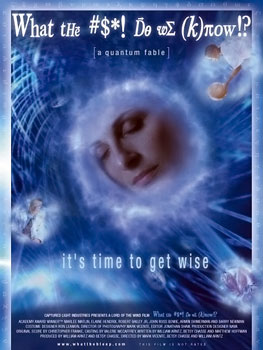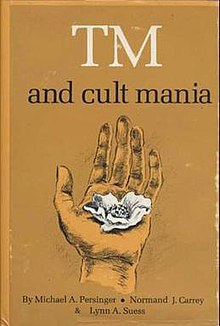
Transcendental Meditation (TM) is a form of silent meditation developed by Maharishi Mahesh Yogi and so named to separate it from Hinduism or any other religious practice. The TM technique involves the silent repetition of a mantra or sound, and is practiced for 15–20 minutes twice per day. It is taught by certified teachers through a standard course of instruction, which costs a fee that varies by country. According to the Transcendental Meditation movement, it is a non-religious method that promotes relaxed awareness, stress relief, self-development, and higher states of consciousness. The technique has been variously described as both religious and non-religious.

Maharishi Mahesh Yogi was the creator of Transcendental Meditation (TM) and leader of the worldwide organization that has been characterized in multiple ways, including as a new religious movement and as non-religious. He became known as Maharishi and Yogi as an adult.

Maharishi International University (MIU), formerly Maharishi University of Management, is a private university in Fairfield, Iowa. It was founded in 1973 by Maharishi Mahesh Yogi and practices a "consciousness-based education" system that includes the Transcendental Meditation technique. Its founding principles are the development of the full potential of the individual, fulfilling economic aspirations while maximizing proper use of the environment and bringing spiritual fulfillment and happiness to humanity.
Maharishi Vedic Approach to Health (MVAH) is a form of alternative medicine founded in the mid-1980s by Maharishi Mahesh Yogi, who developed the Transcendental Meditation technique (TM). Distinct from traditional ayurveda, it emphasizes the role of consciousness, and gives importance to positive emotions. Maharishi Ayur-Veda has been variously characterized as emerging from, and consistently reflecting, the Advaita Vedanta school of Hindu philosophy, representing the entirety of the ayurvedic tradition.

Michael A. Persinger was an American-Canadian professor of psychology at Laurentian University, a position he had held from 1971 until his death in 2018. His best-known hypotheses include the temporal lobes of the human brain as the central correlate for mystical experiences, subtle changes in geomagnetic activity as mediators of parapsychological phenomena, the tectonic strain within the Earth's crust as the source of luminous phenomena attributed to unidentified aerial objects, and the importance of specific quantifications for energy, photon flux density, and small shifts in magnetic field intensities for integrating cellular activity as well as human thought with universal phenomena.
The neuroscience of religion, also known as neurotheology and as spiritual neuroscience, attempts to explain religious experience and behaviour in neuroscientific terms. It is the study of correlations of neural phenomena with subjective experiences of spirituality and hypotheses to explain these phenomena. This contrasts with the psychology of religion which studies mental, rather than neural states.

Ecstasy is a subjective experience of total involvement of the subject with an object of their awareness. In classical Greek literature, it refers to removal of the mind or body "from its normal place of function."

The Transcendental Meditation movement (TM) are programs and organizations that promote the Transcendental Meditation technique founded by Maharishi Mahesh Yogi in India in the 1950s. The organization was estimated to have 900,000 participants in 1977, a million by the 1980s, and 5 million in more recent years.

What the Bleep Do We Know!? is a 2004 American pseudo-scientific film that posits a spiritual connection between quantum physics and consciousness. The plot follows the fictional story of a photographer, using documentary-style interviews and computer-animated graphics, as she encounters emotional and existential obstacles in her life and begins to consider the idea that individual and group consciousness can influence the material world. Her experiences are offered by the filmmakers to illustrate the film's scientifically unsupported ideas.
The God helmet is an experimental apparatus originally called the Koren helmet after its inventor Stanley Koren. It was developed by Koren and neuroscientist Michael Persinger to study creativity, religious experience and the effects of subtle stimulation of the temporal lobes. Reports by participants of a "sensed presence" while wearing the God helmet brought public attention and resulted in several TV documentaries. The device has been used in Persinger's research in the field of neurotheology, the study of the purported neural correlates of religion and spirituality. The apparatus, placed on the head of an experimental subject, generates very weak magnetic fields, that Persinger refers to as "complex". Like other neural stimulation with low-intensity magnetic fields, these fields are approximately as strong as those generated by a land line telephone handset or an ordinary hair dryer, but far weaker than that of an ordinary refrigerator magnet and approximately a million times weaker than transcranial magnetic stimulation.
The Spiritual Counterfeits Project (SCP) is a Christian evangelical parachurch organization located in Pasadena, California. Since its inception in the early 1970s, it has been involved in the fields of Christian apologetics and the Christian counter-cult movement. Its current president is Dr. Mark J Harris. In its role as a think tank, SCP has sought to publish evangelically based analyses of new religious movements, New Age movements, and alternative spiritualities in light of broad cultural trends. SCP has also been at the center of two controversial U.S. lawsuits, one involving church-state issues and the other being a religious defamation case. It published the SCP Journal and Newsletter.
Rational mysticism, which encompasses both rationalism and mysticism, is a term used by scholars, researchers, and other intellectuals, some of whom engage in studies of how altered states of consciousness or transcendence such as trance, visions, and prayer occur. Lines of investigation include historical and philosophical inquiry as well as scientific inquiry within such fields as neurophysiology and psychology.

Norman E. Rosenthal is an American author, psychiatrist and scientist who first described seasonal affective disorder (SAD), and developed light therapy as a treatment.
David W. Orme-Johnson is a former professor of psychology at Maharishi University of Management in Fairfield, Iowa. He is the author of over 100 papers investigating the effects of the Transcendental Meditation technique.

Tony Nader is a Lebanese neuroscientist, researcher, university president, author and leader of the Transcendental Meditation movement. He has a medical degree in internal medicine, received his Ph.D. from Massachusetts Institute of Technology and worked as a clinical and research fellow at a teaching hospital of Harvard Medical School.
The History of Transcendental Meditation (TM) and the Transcendental Meditation movement originated with Maharishi Mahesh Yogi, founder of the organization, and continues beyond his death (2008). In 1955, the Maharishi began publicly teaching a traditional meditation technique learned from his master Brahmananda Saraswati, which he called Transcendental Deep Meditation, and later renamed Transcendental Meditation.
The Transcendental Meditation technique is the technique associated with the practice of Transcendental Meditation developed by the Indian spiritual figure Maharishi Mahesh Yogi. The practice involves the use of a private mantra, and is practised for 20 minutes twice per day while sitting comfortably with one's eyes closed. TM instruction encourages students not to be alarmed by random thoughts which may arise, but to easily return to the mantra when one becomes aware of this.

The Relaxation Response is a book written in 1975 by Herbert Benson, a Harvard physician, and Miriam Z. Klipper. The response described in the book is an autonomic reaction elicited by a mental device and a passive attitude that has been used for altered states of consciousness throughout various religious traditions and cultures. The scientific characterization of the relaxation response was initially prompted by research studies on Transcendental Meditation ("TM"), a yogic meditation technique, that was presented primarily to people in the Western world.

David Wants to Fly is a 2010 German documentary film that follows its director, Berlin-based, film school graduate David Sieveking, as he interacts with his film hero David Lynch, and explores the Transcendental Meditation movement. The film chronicles a period of time in Sieveking's life that includes his off-and-on relationship with his girlfriend as well as his travels to the United States, Holland and India. The film has received awards and honorable mentions as well as criticism.
Transcendental Meditation in education is the application of the Transcendental Meditation technique in an educational setting or institution. These educational programs and institutions have been founded in the US, United Kingdom, Australia, India, Africa and Japan. The Transcendental Meditation technique became popular with students in the 1960s and by the early 1970s centers for the Students International Meditation Society were established at a thousand campuses in the US with similar growth occurring in Germany, Canada and Britain. The Maharishi International University was established in 1973 in the US and began offering accredited, degree programs. In 1977 courses in Transcendental Meditation and the Science of Creative Intelligence (SCI) were legally prohibited from New Jersey (USA) public high schools on religious grounds by virtue of the Establishment Clause of the First Amendment. This "dismantled" the TM program's use of government funding in U.S. public schools "but did not constitute a negative evaluation of the program itself". Since 1979, schools that incorporate the Transcendental Meditation technique using private, non-governmental funding have been reported in the US, South America, Southeast Asia, Northern Ireland, South Africa and Israel.









